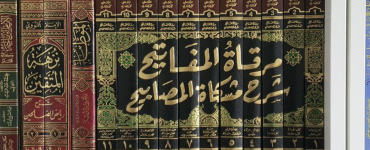Respected Student,
Assalāmu ‘alaykum wa raḥmatullāhi wabarakātuhu,
مرحبا بوصية رسول الله صلى الله عليه وسلم
All praises are due to Allāh Ta’ālā and may peace and salutations be upon the Prophet ﷺ.
Indeed, it is the great kindness of Allāh Ta’ālā that He divinely selected and very specifically chose you to study the blessed words of our beloved Prophet ﷺ.
You are really very fortunate. Your day and night will be spent with Qāl ar-Rasūl ﷺ. There is no exaggeration in saying that you are amongst those who are the most blessed.
To derive maximum benefit from this year in which your day and night will revolve around the words of the Prophet ﷺ, I would like to offer the following reminders. If we keep these in mind, then, inshā Allāh, the lessons of this one year will have a very positive and beautiful impact on your life.
INTENTION
The status of aṣ-Ṣiḥāḥ as-Sitta [1]The six canonical books. is not unknown; they are regarded as the greatest books after the noble Qur’ān. Throughout the centuries and to this day, almost all of our illustrious scholars regarded and continue to regard the aṣ-Ṣiḥāḥ as-Sitta as the best and greatest books after the noble Qur’ān.
If we are studying such lofty books, then it follows that our studying must be a means of us obtaining spirituality in this world and the blessed company of the Prophet ﷺ in the next. Consequently, I would like to remind you of the importance of correcting our intentions.
When studying Āḥadīth, our intention must be that we are studying only and solely for the pleasure of Allāh Ta’ālā, and out of love for the Prophet ﷺ. The primary goal and most important objective of all the lessons is to obtain the Du’ās of the Prophet ﷺ and to derive the blessings from his noble and blessed words.
All the academic discussions and in-depth explanations that are provided in lessons are secondary. If you are unable to keep up with the explanations during the lesson, you can always study later. However, at this point, every lesson must be a means of us obtaining all the rewards of seeking knowledge in general and obtaining the blessings of studying the blessed words of the Prophet ﷺ in particular. These are gained through rectifying and renewing our intentions.
As you have studied other books of Aḥādīth before, I need not mention all the great rewards for studying the noble Āḥadīth. I recommend, however, that you all read Sharf Asḥāb al-Ḥadīth by ‘Allāmah al-Khaṭīb (may AllāhTa’ālā have mercy on him). There is a review as well as a PDF link for this book on our website. [2]https://ulumalhadith.com/book-review-sharafu-as%cc%a3h%cc%a3ab-al-%e1%b8%a5adith/
ĀDAB [3]Etiquettes.
After correcting our intentions, you should take guidance from Imām al-Bukhārī (may Allāh Ta’ālā have mercy on him) concerning how to respect and honour the blessed Aḥādīth. The following are some ways in which you can display Ādāb before the noble Aḥādīth:
-
- Through ensuring that you are in a state of Wuḍū; thereafter applying scent and praying two Rak’āts of prayer. You should strive to sit in the lesson, for as long as possible, in the Tashhahud position with utmost dignity and respect. Picture yourself and imagine that you are in the blessed presence of the Prophet ﷺ and he is talking to you directly;
-
- Through listening attentively to every narration and not allowing yourself to become distracted;
-
- Through reading Aḥādīth with utmost humility and respect; in a manner that is befitting to the Aḥādīth;
-
- Through honouring and decorating yourself with Adab before your respected teachers; making Khidmah and ensuring that maximum amount of time is spent in their company; and
Through guarding your lessons; ensuring that they are our biggest priority and all other errands revolve around them. The ‘Ulamā of the past understood the importance of attending the lessons live to such an extent that they would not even attend the Janāzah of close relatives. What then can be a valid reason for remaining absent?!
LESSONS
As for the lessons in and of themselves, please take note of the following guidelines.
Approach to studies
Inshā Allāh, your respected teachers will be quoting from lots of commentaries and many different scholars. It is best to first concentrate and understand all that he mentions. Appreciate his research, which is probably based on decades of study and reading thousands of pages.
Whilst the most ideal situation is that students should read some commentaries, this may not be possible for you due to the number of lessons that you will have daily. As such, it is best that you approach your studies in the following manner:
-
- First, understand the explanations that your respected teachers provide.
-
- Then, if you have more time, you may crosscheck all the references that are quoted and gain acquaintance with your respected teachers’ sources.
-
- Finally, if, and only if, you have even more spare time, then you should read commentaries.
The reason for the above approach is simple: you will always have an opportunity in the future to consult the great commentaries, inshā Allāh. However, when your time is limited then you should prioritise and focus on that which is most important at that moment. Right now, the explanations of your honourable teachers are the most important, and their information is ultimately based on the magnificent and sublime commentaries of our illustrious scholars.
Commentaries
Due to the importance of these six books, lots of commentaries have been written on them. These commentaries range from a single volume to commentaries that are compiled into dozens of volumes. Similarly, some commentaries focus heavily on one aspect that may not interest you, whilst other commentaries may focus on topics pertaining to your interests. For example, one commentary may go into lots of detail concerning the linguistic intricacies, whilst another may involve lengthy discussions on the chains of transmission. Hence, deciding which commentary to obtain is a subjective matter; it depends on your current situation and even on your future plans. What may be a good commentary for another person may not be the best commentary for you and vice versa.
You also need to consider the busy schedule of this final year. Whilst Fatḥ al-Bārī might be the greatest commentary, it might not be wise for you to get such a lengthy commentary during this busy year. It will not be wise to invest so much money right now in a commentary like Irshād as-Sārī when you will hardly get time to read even a few pages daily.
In light of the above, you should discuss the commentaries and make Mashwara [4]Consultation. with your respected teachers regarding which commentary is more befitting and ideal for your needs; currently and in the future.
Having said that, please do not forget: the final year is about spirituality. Thus, rather than trying to read more commentaries, it is better and more beneficial that you focus on actions that will increase your spirituality, such as inculcating Tahajjud and the Sunnah fasts (such as Monday and Thursday fasts) in your life and making other similar acts habitual. Included herein is Khidmah of your respected teachers as mentioned above. This is your final year; do not waste this golden opportunity to derive maximum benefit from the company of your respected teachers.
Memorisation
We are advised to aim high. Thus, I recommend that you should try to memorise one narration from each book daily. By the end of the year, you will know by heart over a thousand narrations that span across the six canonical books. This is not an unreasonable task and with some effort and sacrifice, it can be accomplished. Remember that by memorising Āḥadīth, you are a recipient of the Du’ās of none other than the Prophet ﷺ himself.
If you are unable to memorise, it will still be very beneficial to recite the noble Āḥadīth of the Prophet ﷺ numerous times. In doing so, you will be attracting a lot of Anwārāt [5]Celestial light. into your heart and Barakāt[6]Divine blessings. in your life.
Further, you should also aim to memorise any Du’ās that come in the noble books, and practise reciting them at the specified times. As mentioned earlier, this year is all about increasing our A’māl with the intention that our actions become lifelong habits, inshā Allāh.
As for the explanations and discussions during the lessons, indeed they may be quite heavy to digest, let alone memorise. Therefore, even if you understand a brief overview, it is sufficient. Even if you do not understand some of the intricate details, that is also fine. Despite a defect in understanding, you will still be benefiting because you are sitting in a lesson wherein very great books are being taught.
Thus, I advise that you use the in-depth discussions as a motivation for yourself, to try and build the ability to study further on your own. You may not keep up with everything now, but if these explanations are a means of developing within you an eagerness for research and an unquenchable thirst for even more studying, then that is a great accomplishment.
POST-LESSONS
Most seminaries have sessions for Takrār. [7]Revision. In these sessions, you should have a rigorous discussion and do an extensive and critical analysis of all the explanations that are provided during lessons.
Your respected teachers will be discussing lots of differences of opinions between eminent scholars whom we are not even fit to be the dust on their sandals. May Allāh Ta’ālā elevate their ranks. During Takrār, please do not mention anything negative about any scholar, even if the comment is in jest. Such comments could be very detrimental to you.
FINAL WORDS
The main purpose of any study of Aḥādīth is to practise on the blessed Aḥādīth, and that is more important than all the technicalities and detailed discussions. Whenever we read the Aḥādīth of Faḍāil, we should practise upon them on that very same day.
Furthermore, whilst we should have the intention of propagating the great Āḥadīth, remember that it is more important that we should first benefit ourselves; we need to try to inculcate these Sunan into our own lives first.
Please remember that studying Āḥadīth is the greatest thing that one can do. Shaytān is not going to leave you. Rather, he is going to exert extra effort to try and distract you. Please do not give in to his whispers and plots.
In addition, your Nafs is your enemy and at times it will make you lose interest or cause you to give preference to comfort over studying. Be aware, remain cautious, and please do not give in.
Besides sins, the concept of Muruwwa [8]Self-respect and carrying oneself in a dignified manner. plays a big role in the Āḥadīth. As you are growing, learn how to conduct yourself as a bearer of the noble Āḥadīth. You should also keep in mind the following words of Abū Bakr ibn Duraid
يا طالِبي عِلمَ النَبِيِّ مُحَمَّدٍ ما أَنتُم وَسِواكُمُ بِسَواءِ
“O the one studying the knowledge of Muhammad.
You and others are not the same.”[Jāmi Bayān al-‘ilm, vol 1, pages 161 and 162]
You have to excel in more worship. Your character is different to one who was not blessed with this privilege.
Also keep in mind the following statement of al-Ḥasan al-Baṣrī (may Allāh Ta’ālā have mercy on him):
كان الرجل إذا طلب العلم لم يلبث أن يرى ذلك في تخشعه وبصره ولسانه ويده
“A man would seek knowledge, and soon that would be seen in his humility, his conduct, and the way in which he spoke and acted.”[Az- Zuhd of Ibn al-Mubārak, page 28]
Finally, you must constantly keep in mind that Allāh Ta’ālā has granted you the great honour and brilliant opportunity of studying the noble words of the Prophet ﷺ. Thus, you should express your gratitude for this by spending your free time sending abundant Ṣalawāt and Durūd upon the Prophet ﷺ.
I pray that Allāh Ta’ālā makes your studies beneficial for you. May He accept you to defend and propagate the noble teaching of the Prophet ﷺ and may He bless you with the noble companionship of the Prophet ﷺ in the hereafter.
Footnotes[+]






